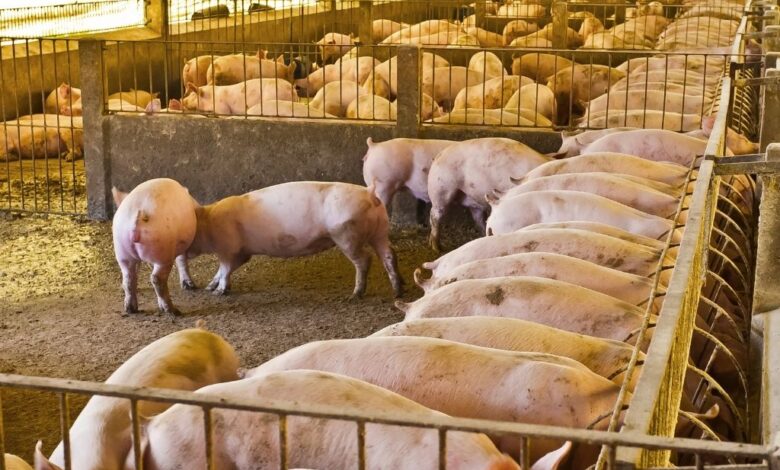Top 15 Indigenous Pig Breeds in Nigeria
-
Fulani Pig
The Fulani pig, also known as the Bunaji pig, is a small to medium-sized breed native to northern Nigeria. They are well-adapted to the harsh environmental conditions of the Sahel region. Fulani pigs have a compact body, short legs, and a straight snout. They are highly resilient, hardy, and have good foraging abilities, making them ideal for extensive and low-input farming systems.
-
Yoruba Black Pig
The Yoruba Black pig is an indigenous breed found primarily in southwestern Nigeria. They have a black coat, a long snout, and erect ears. Yoruba Black pigs are known for their adaptability, hardiness, and ability to thrive in diverse agro-ecological zones. They have good reproductive traits and are valued for their meat quality, making them a preferred choice for local consumers.
-
Hausa Brown
The Hausa Brown pig is a popular indigenous breed widely distributed across Nigeria. They have a brown coat, a long snout, and droopy ears. Hausa Brown pigs are highly adaptable to different climatic conditions, including the hot and humid regions of Nigeria. They are resilient, fast-growing, and have good mothering abilities, making them suitable for both backyard and commercial pig farming.
-
Nigerian Dwarf Pig
The Nigerian Dwarf pig is a small-sized indigenous breed found primarily in the southern parts of Nigeria. They have a compact body, short legs, and erect ears. Nigerian Dwarf pigs are highly valued for their adaptability, high fertility rates, and good mothering abilities. Despite their small size, they can be a valuable source of income for small-scale farmers, especially in peri-urban and urban areas.
-
Rivers Pig
The Rivers pig, also known as the Ikwerre pig, is an indigenous breed found in the Niger Delta region of Nigeria. They have a black coat, a long snout, and droopy ears. Rivers pigs are well-suited to the humid and swampy conditions of the Niger Delta. They are known for their good reproductive performance, resistance to diseases, and ability to utilize locally available feed resources.
-
Balami
The Balami pig is an indigenous breed native to the northeastern parts of Nigeria. They have a white or light-colored coat, a long snout, and droopy ears. Balami pigs are highly adapted to the arid and semi-arid regions of the country. They are known for their hardiness, resistance to diseases, and efficient utilization of low-quality feeds, making them suitable for extensive and pastoral farming systems.
-
Uda Pig
The Uda pig is an indigenous breed found in the middle belt region of Nigeria. They have a black or black and white-spotted coat, a long snout, and droopy ears. Uda pigs are highly valued for their meat quality, good mothering abilities, and resistance to common pig diseases. They are adaptable to a wide range of farming systems and have the potential to contribute to the local pork industry.
-
Dangawal
The Dangawal pig is an indigenous breed native to Kebbi State in northern Nigeria. They have a black coat, a long snout, and droopy ears. Dangawal pigs are well-adapted to the arid and semi-arid regions, where feed availability can be limited. They are known for their hardiness, resistance to diseases, and ability to thrive on locally available feed resources, including crop residues and forages.
-
Akunu Doka
The Akunu Doka pig is an indigenous breed found in the middle belt region of Nigeria. They have a black coat, a long snout, and droopy ears. Akunu Doka pigs are highly valued for their meat quality, good mothering abilities, and adaptability to various management systems. They are suitable for both backyard and commercial pig farming, contributing to the local pork production.
-
Adamawa Gudali NYSC Portal
The Adamawa Gudali pig is an indigenous breed primarily found in Adamawa State in northeastern Nigeria. They have a black or black and white-spotted coat, a long snout, and droopy ears. Adamawa Gudali pigs are known for their hardiness, adaptability to the local environmental conditions, and ability to thrive on low-quality feeds. They are suitable for extensive and low-input farming systems.
-
Shika Brown
The Shika Brown pig is an indigenous breed found in the northern parts of Nigeria. They have a brown coat, a long snout, and droopy ears. Shika Brown pigs are highly adaptable to the arid and semi-arid regions and are well-known for their good reproductive performance and fast growth rate. They are commonly reared by small-scale farmers for subsistence and income generation.
-
Mambila
The Mambila pig is an indigenous breed native to the Mambila Plateau in Taraba State, Nigeria. They have a black coat, a long snout, and droopy ears. Mambila pigs are highly valued for their meat quality, good mothering abilities, and adaptability to the highland environments. They are known to produce flavorful meat and contribute to the local pork industry.
-
Kano Brown JAMB Portal
The Kano Brown pig is an indigenous breed found in Kano State in northern Nigeria. They have a brown coat, a long snout, and droopy ears. Kano Brown pigs are well-adapted to the hot and dry conditions of the region. They are known for their hardiness, adaptability, and ability to utilize locally available feed resources. Kano Brown pigs are reared by small-scale farmers for subsistence and income generation.
-
Jarra
The Jarra pig is an indigenous breed found in the northeastern parts of Nigeria, primarily in Yobe State. They have a black coat, a long snout, and droopy ears. Jarra pigs are highly adapted to the arid and semi-arid environments and are known for their hardiness, resistance to diseases, and efficient utilization of locally available feed resources. They are reared by pastoralists and small-scale farmers for meat production and income generation.
-
Riga
The Riga pig is an indigenous breed found in the northern parts of Nigeria, particularly in Bauchi and Plateau States. They have a black or black and white-spotted coat, a long snout, and droopy ears. Riga pigs are well-adapted to the local environmental conditions and are known for their hardiness, resistance to diseases, and ability to thrive on low-quality feeds. They play a significant role in the local pig farming systems and contribute to the local pork industry.
Conclusion
The indigenous pig breeds of Nigeria are a testament to the country’s rich agricultural heritage and genetic diversity. These breeds have evolved over generations to adapt to the local climate, feeding conditions, and cultural practices. They offer various advantages such as adaptability to local environments, disease resistance, good reproductive traits, and the ability to utilize locally available feed resources. Small-scale farmers can benefit from these indigenous pig breeds by harnessing their unique characteristics and contributing to the local pork industry while preserving the genetic diversity of Nigeria’s native pig populations.



